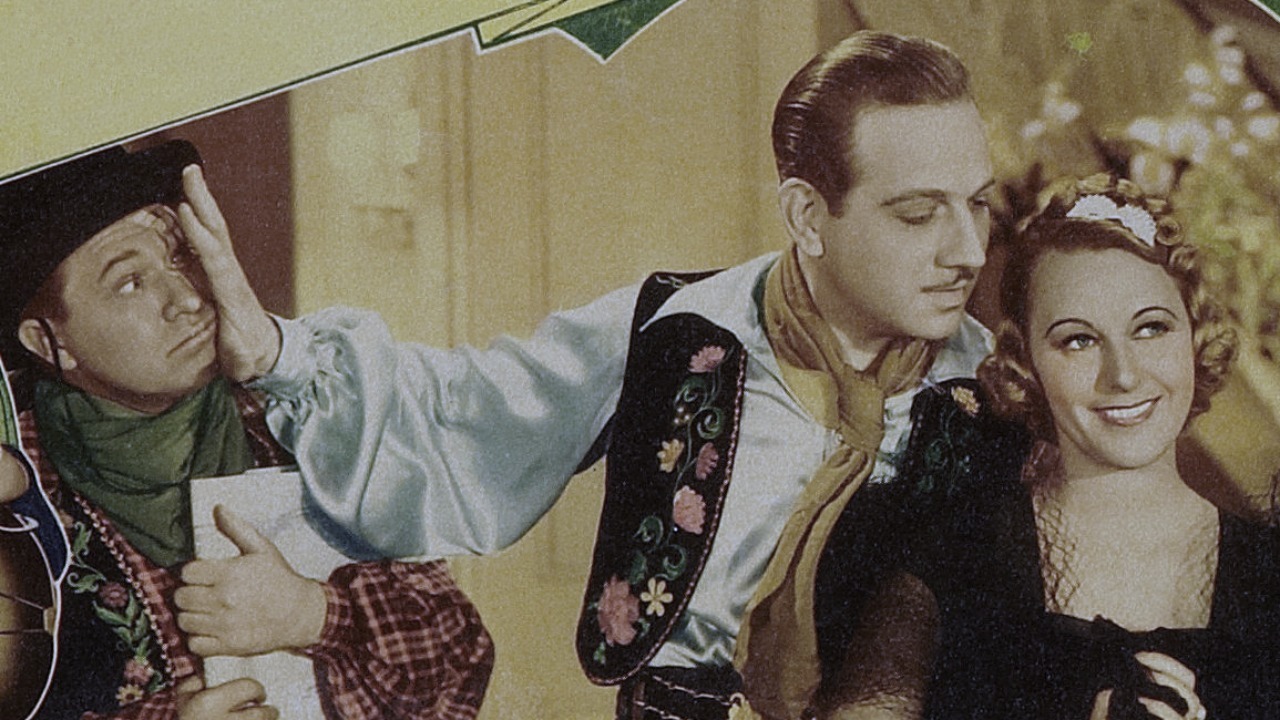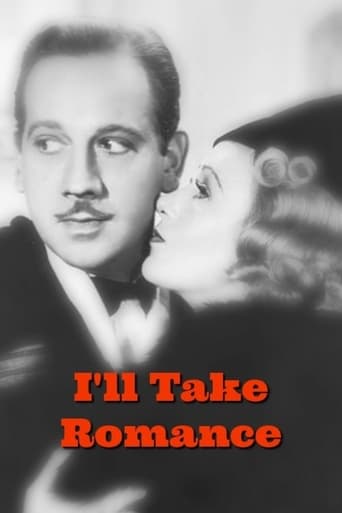Ensofter
Overrated and overhyped
Kidskycom
It's funny watching the elements come together in this complicated scam. On one hand, the set-up isn't quite as complex as it seems, but there's an easy sense of fun in every exchange.
AutCuddly
Great movie! If you want to be entertained and have a few good laughs, see this movie. The music is also very good,
Ella-May O'Brien
Each character in this movie — down to the smallest one — is an individual rather than a type, prone to spontaneous changes of mood and sometimes amusing outbursts of pettiness or ill humor.
mark.waltz
An early attempt for success in film operetta as the rival to Jeanette MacDonald didn't work well for opera diva Grace Moore ended quickly thanks to the public aversion to musicals, but the sudden success of movie musicals brought her back with a fair amount of critical acclaim and public interest. She lightened up her personality, mixing in daffy comedy with the Aria's, even tossing in a few standards and popular novelty songs. Here, she's a seemingly high strung diva who finds out that she does have a sense of fun, finding romance with agent Melvyn Douglas who is trying to get her to honor an engagement in Argentina that she's reneged on for a vacation in France. With his verve, she might change her plans, but not without some issues along the way.There's an "oom pah pah" feeling to a few of the non opera songs she gets to sing that will surely have your feet tapping. She has a sparkling personality and a dazzling smile to boot, certainly no iron butterfly (Jeanette MacDonald's nickname). In fact, she was the one to score an Old nomination for "One Night of Love" while MacDonald was overlooked for her big success, "The Merry Widow". Douglas, so serious looking, proved that he was not what he seemed as a leading man in screwball comedy. Then there's Helen Westley as her mentor, a retired opera star embittered by age yet only gruff on the outside, suddenly young again when Douglas makes up a story simply to get on her good side. Westley has several hysterical exchanges with Moore's wisecracking maid, played with a witchy know how by the scene stealing Margaret Hamilton who gets a laugh simply by commenting on her own appearance. In a brief drunk scene, she's an absolute hoot.This is the type of film that becomes charming simply because it is not as highbrow as one would expect, made with the intention of bringing classical music to the masses in an appealing way. When Moore sings a famous aria from "La Traviata", Douglas's pal, Stuart Erwin, comments on his curiosity as to why it is so often revived when it was originally a flop. Moore shows just how lovely she is when she sings the title song. It's a shame that she only made a handful of film's, as she has the look and charm of Irene Dunne, the voice of an angel, and a fantastic wardrobe. Coming from Columbia (at the time considered a poverty row studio), this has all the elegance of the majors, and is done tastefully without becoming long haired and uppity.
chriggsiii
I was moved to write this review because I took strong exception to some of the other reviews I just read here of this film.Is it a masterpiece? No. Is it predictable to a certain extent? Sure.But the singing and the musical numbers are not interruptions; they are not diversions; they are the whole point.In fact, the entire movie, more than anything, is a reinforcement of the message that music, and a wonderful person who sings it beautifully, is something important enough for folks to travel halfway across the globe to engage and to hire.Every time the movie takes its time to present a snippet of Traviata in its entirety or, more miraculously and effectively, a huge totally uncut snippet from the wonderful first-act duet in Butterfly, it is sending the message "You wonder why it's so important to the Buenos Aires management that Miss Telly keep her contract and sing at their opera house? This is why! Listen to that music and listen to that voice." If the movie is about the need to persuade an errant diva to fulfill her contract, then the musical numbers answer the question as to WHY it's so important. Why is it so important to them? Why are they angry enough to sue over the loss of such an opportunity? The musical numbers answer that question, the Butterfly sequence most eloquently of all. Moore's perfect light lyric soprano voice lifts the movie from mere silliness to real sentiment. Without them, the movie would really have no point. I'm really surprised that so many of you didn't get that!!!
TheLittleSongbird
As far as Grace Moore films go, 'Louise' and 'One Night of Love' are better films, but having been let down by 'When You're in Love' (yes even with the presence of Cary Grant) 'I'll Take Romance is superior to that. Haven't seen 'Jenny Lind' yet, but am in two minds as to whether it will be good or not.'I'll Take Romance' is not a great film, but it's good fun and it is difficult to not be taken by its charm. The story is slight, it's also predictable and gets sometimes on the wrong side of incredibly silly. Moore showed in other films that comedy comes naturally to her, but they were films with a frothier approach. Here the timing (as it's more screwball-like comedy) needed to sharper and wittier and she struggles a little.Have to concur also that, as good as the operatic music is as music on its own, other films have done much better jobs at integrating opera into their stories. Here they are well sung (though Butterfly is rather heavy a role for Moore's voice from personal opinion), but it does feel like they are there for the reason of having opera to showcase Moore's voice without finding a way to weave it into the story in a relevant way, consequently they do slow the film down, especially when the scenes from 'Madama Butterfly' and 'Martha' are long. A couple are more interesting than others, coming off least is actually the least known one 'Martha', it was interesting to see and hear a non-standard repertoire excerpt but the staging was static and indifferently directed.On the other hand, 'I'll Take Romance' is a beautifully photographed and produced film and mostly very nicely directed (only 'Martha' doesn't quite come off, and it could be to do with that the drama in the opera is not the most compelling in the first place, not bad as such but there are operas that are more involving dramatically in general). The music is wonderful especially the title song, there are no qualms with the music itself it's just the placement.Scripting is witty, funny, frothy without being shallow and don't fall into schmaltz. Moore is charming and likable, though her character frustrates at times, while Margaret Hamilton and Stu Erwin provide sterling comic support. Best of all is debonair Melvyn Douglas, a role that fits him like a glove and one that he can do in his sleep and still engage the pants off you, a contender for Moore's best leading man. The romantic chemistry is sweet without being sentimental and endearing.To conclude, charming, romantic and fun, reservations for the story and placement and timing of the operatic excerpts aside. 7/10 Bethany Cox
jennyp-2
Predictable froth - but I loved it. Opera diva Grace Moore played Opera diva Elsa Terry who reneged on a performance date in Buenos Aires in favor of a more lucrative offer from Paris. Melvyn Douglas is sent in to win her back. He pretends to fall in love with Moore without revealing his true identity and then, guess what? He really does fall in love! But not before she catches on and is hurt. Of course, all's well in the end. Stuart Erwin and Margaret Hamilton (two years before her Wicked Witch days) are terrific as comedy relief sidekicks for the two leads. Moore performs some lovely arias in full costume including the gavotte from Manon. And the title tune is still running through my head. Screened at Cinefest in Syracuse New York.

